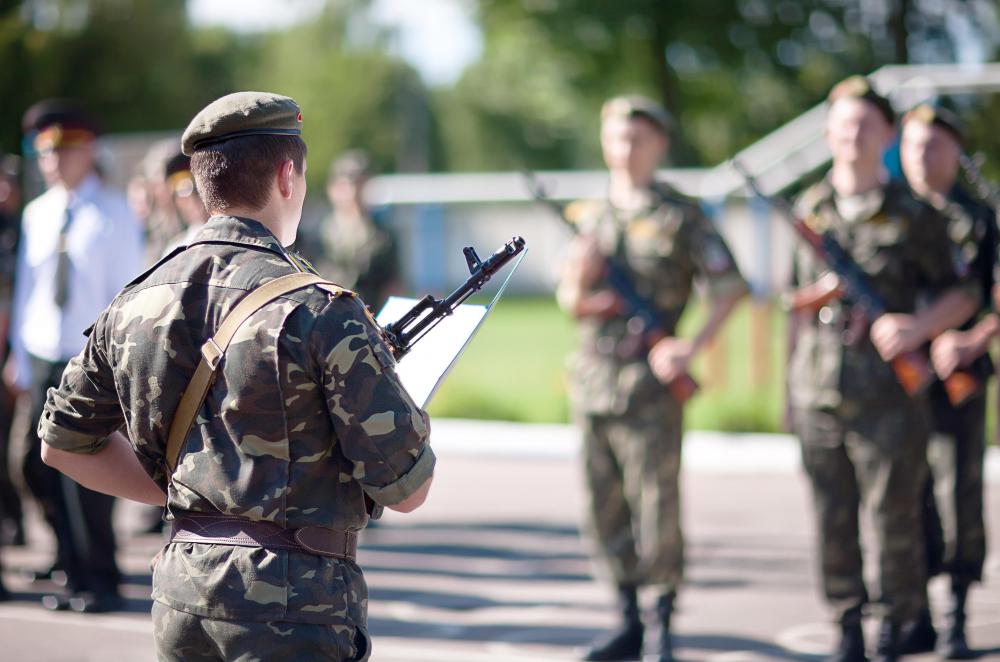At WiseGEEK, we're committed to delivering accurate, trustworthy information. Our expert-authored content is rigorously fact-checked and sourced from credible authorities. Discover how we uphold the highest standards in providing you with reliable knowledge.
What is Military Justice?
In the United States, military justice refers to the set of laws by which members of the U.S. Armed Forces must abide. These laws were established by the US Congress in 1950 when it enacted the Uniform Code of Military Justice, known as UCMJ. All servicemen and servicewomen must follow this code, which contains not only basic criminal laws but also laws specific to the duties of soldiers. The main method of enforcing military justice is through the court-martial process, which ensures a fair trial for all enlistees while enforcing the laws contained in the UCMJ.
From the foundation of the U.S. in 1776 through World War II in the 1940s, different branches of U.S. military service were governed by different laws. World War II produced huge amounts of court-martial proceedings and there were many complaints from servicemen about unfair treatment. Dismayed by this situation, the U.S. Congress took steps to rectify the status of military justice by enacting the UCMJ, which established the military criminal code that governs all branches of service.

The UCMJ essentially banned many offenses found in the U.S, Constitution, crimes like murder, theft, or use of illegal substances. In addition, it identified crimes which were unique to military justice. Some of these offenses include dereliction of duty, going absent without leave, disrespect to superiors, and conduct unbecoming an officer. Crimes made in times of war, such as spying or misbehavior before the enemy, were also identified.

All service members fall under the jurisdiction of the UCMJ. Although prisoners of war and members of certain organizations that may be involved with the military are subject to this code, it mostly applies to active duty personnel. In most cases, this means that the code applies from the time an individual enlists to the time he or she receives a valid discharge. Since U.S. military personnel are deployed all over the world, the UCMJ can hold jurisdiction over actions in foreign countries as well, although the host country may become involved if its laws are broken in the process.

If a soldier fails to live up to some aspect of the UCMJ or breaks one of more of the laws therein, he or she can be subject to the military court proceeding known as a court-martial. The court-martial process follows many of the same rules found within the U.S. civilian judicial process, such as the right of the accused to an attorney and a trial before a judge and jury. Types of courts martial include summary courts-martial for minor offenses, special courts-martial for intermediate offenses, and general courts-martial for the most serious offenses.
AS FEATURED ON:
AS FEATURED ON:















Discussion Comments
I remember when I served in the Air Force years ago, we were all issued a copy of the uniform code of military justice. I expected a lot of civilian offenses, like drug possession or murder, would also be considered offenses in the military justice system, but there were also some surprises. There are quite a few offenses listed in the military justice manual that have to do with personal conduct and off-duty behavior.
I personally never had to face a ucmj hearing, but I had a few friends who did. One was caught sleeping while on security detail and charged with dereliction of duty. He spent a little time in a small cellblock on base, almost like a small city's holding tank. He said he wasn't mistreated or anything, just prevented from doing his usual assignment until he learned his lesson about sleeping on the job.
My brother was in the Navy for 6 years when he developed a serious problem with alcohol abuse. He claimed it was triggered by the stress of his job as a medical corpsman attached to a Marine combat unit. He was obviously an adult, so the possession of alcohol itself was not a crime. But according to his Navy supervisors, he started showing up for duty in a clearly intoxicated state, making him a risk to himself and others. They charged him with a violation of the uniform code of military justice and sought a dishonorable discharge.
He had to hire a military-approved attorney and wait almost a year for his case to be heard in the military justice system. By that point, he was already eligible to be discharged based on his years of service. He left the Navy before the hearing took place. I think that's a common occurrence in military courts. Unless the serviceman in question is career military, many of these cases become moot in a few years.
Post your comments